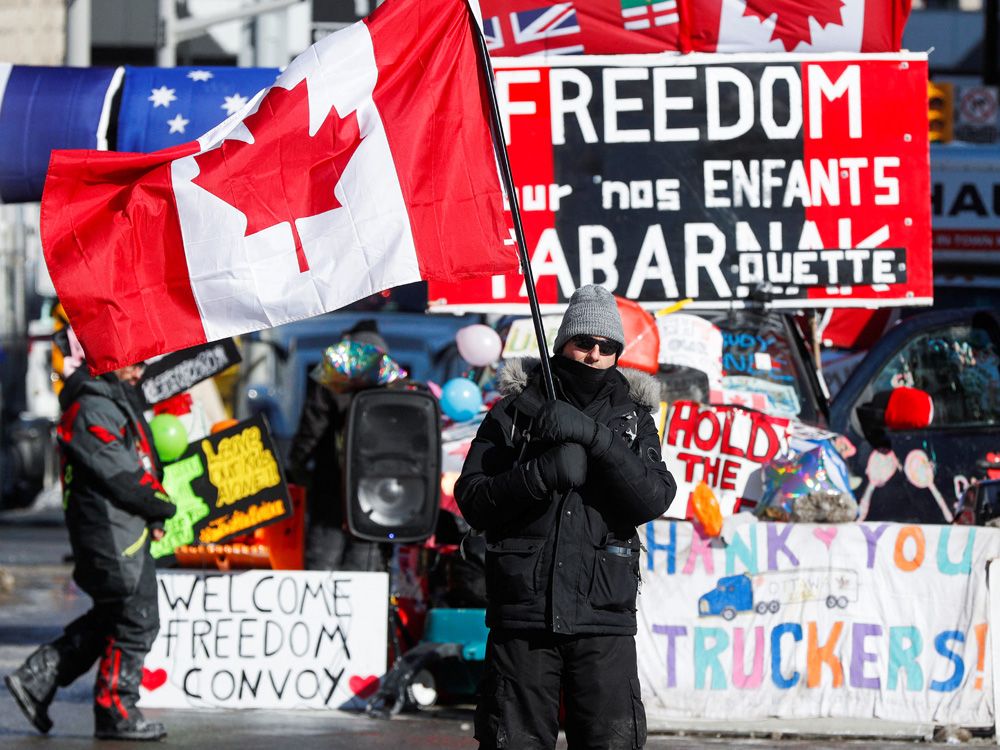Trudeau invokes Emergencies Act for countrywide blockades

‘The blockades are harming our economy and endangering public safety’

Article content
Prime Minister Justin Trudeau invoked the Emergencies Act, giving his cabinet temporary powers to take over management of the countrywide blockades by vaccine-mandate protestors that have arrested trade and thrust the City of Ottawa into a state of emergency.
Advertisement
Story continues below
This advertisement has not loaded yet, but your article continues below.
Article content
Trudeau consulted with provincial premiers Monday morning after assembling his cabinet for a rare Sunday night meeting.
“The blockades are harming our economy and endangering public safety,” Trudeau said at a press conference in Ottawa.
Truck drivers upset over a federal order that required proof of vaccination to return to Canada at land borders and other civilians set up a blockade of Ottawa at the end of January. Thousands would descend on the capital, blocking streets, blaring their horns and disrupting civilian mobility.
In a matter of weeks, the “Freedom Convoy” spread to other Canadian cities, including Windsor, Ont., Coutts, Alta., and Emerson, Man. Ottawa Mayor Jim Watson declared a state of emergency on Feb. 6. On Friday, after barricaders had blocked the Ambassador Bridge between Windsor and Detroit for four days, Ontario Premier Doug Ford declared a state of emergency for the whole province.
Advertisement
Story continues below
This advertisement has not loaded yet, but your article continues below.
Article content

Invoking the Emergencies Act gives the federal government short-lived powers to limit civilian travel, use or dispose of property, manage the provision of essential services such as policing to fine or imprison people, according to a memo on the federal website. It does not mean that the prime minister will deploy the military to shut down the protests, an extreme response that he’s described as a “last resort.”
It’s the first time the Emergencies Act has been invoked. In 1988, it replaced the War Measures Act, which Pierre Trudeau, the prime minister’s father, used in 1970 during the October Crisis.
Last week, blockades reached a fevered pitch when protesters shut down important trade routes along the Canada-U.S. border. Police in Windsor dispersed protestors at the Ambassador Bridge on Sunday, arresting dozens of people and seizing vehicles.
Advertisement
Story continues below
This advertisement has not loaded yet, but your article continues below.
Article content
The week-long blockade disrupted trade and forced several car plants reliant on integrated supply chains between Canada and the U.S. to shut down production. Paul Krugman, an economist at City University of New York, estimated that the losses were somewhere between US$200 and US$300 million per day. Normally, the Ambassador Bridge facilitates more than US$360 million in two-way trade daily and carries a quarter of the value of goods that flow between Canada and the United States.
The Ontario government followed its decision to trigger a state of emergency last week with a promise on Monday to advance its timeline for easing COVID-19 restrictions. Ford said he would end vaccine passport protocols and scrap indoor capacity limits.
Advertisement
Story continues below
This advertisement has not loaded yet, but your article continues below.
Article content
-

How the Ambassador Bridge blockade hit Canada’s economy — and our reputation
-

Ambassador Bridge standoff is over, but deep divisions remain
-

Ontario announces end to vaccine passports, other COVID-19 restrictions by March 1
“Lifting COVID-19-related business restrictions sooner than initially planned is positive news for Ontario business and economic recovery,” Rocco Rossi, president of the Ontario Chamber of Commerce, said in a statement. “Meanwhile, vulnerabilities such as inflation, labour shortages and supply chain disruptions, have been exacerbated by the global state of emergency.”
In Coutts, Alta., protesters and truckers have blocked a key goods crossing into Montana since the end of January. On Monday, RCMP arrested 11 people and seized their weapons. The RCMP recovered 13 long guns, hand guns, body armour, a machete, ammunition and high capacity magazines.
Advertisement
Story continues below
This advertisement has not loaded yet, but your article continues below.
Article content
The blockades will add strain to Canada’s economy and could fuel growing American protectionist sentiment. In the short-term, blockages at the border are going to put pressure on consumer prices and slow economic growth, said Royce Mendes, director of macro strategy at Desjardins.
Before the protests, the Bank of Canada had forecast two per cent GDP growth, annualized, in the first quarter after the economy posted sizeable gains late last year. Many economists, including Mendes, now expect first-quarter GDP growth to be flat and inflation to surge as a result of shortages caused by the blockades.
“I don’t want to exaggerate the likely impact of all of this for either growth or inflation, but it is a step in the wrong direction on both of those fronts, rather than the hopeful steps in the right direction that we were expecting to see after the Omicron wave,” Mendes said in an interview.
• Email: bbharti@postmedia.com | Twitter: biancabharti
Advertisement
Story continues below
This advertisement has not loaded yet, but your article continues below.








